With so many superfoods in the market, deciding which one to add to your diet can be challenging. Both chia seeds and flax seeds are packed with essential nutrients and offer numerous health benefits, but which one is better for your health? Let’s dive into the similarities and differences between chia and flax seeds.
Chia and flax seeds are two nutrient-dense powerhouses that have gained immense popularity for their numerous health benefits and culinary versatility. Packed with essential nutrients, including protein, healthy fats, vitamins, minerals, and fiber, these tiny seeds have captured the attention of health-conscious individuals and food enthusiasts alike.
Both chia and flax seeds offer unique advantages, with chia seeds known for their gel-forming properties and higher calcium content, while flax seeds stand out for their rich lignan content (Lignans are polyphenolic compounds found in plants posing health benefits, like lowered risk of heart disease, menopausal symptoms, osteoporosis and breast cancer.
Whether sprinkled over yogurt, blended into smoothies, used as an egg substitute in baking, or incorporated into various dishes, these seeds add nutritional value and a delightful texture to meals. This article will explore the distinct nutritional profiles, health benefits, and culinary applications of chia and flax seeds, helping you make informed choices on integrating them into your daily diet for optimal well-being.
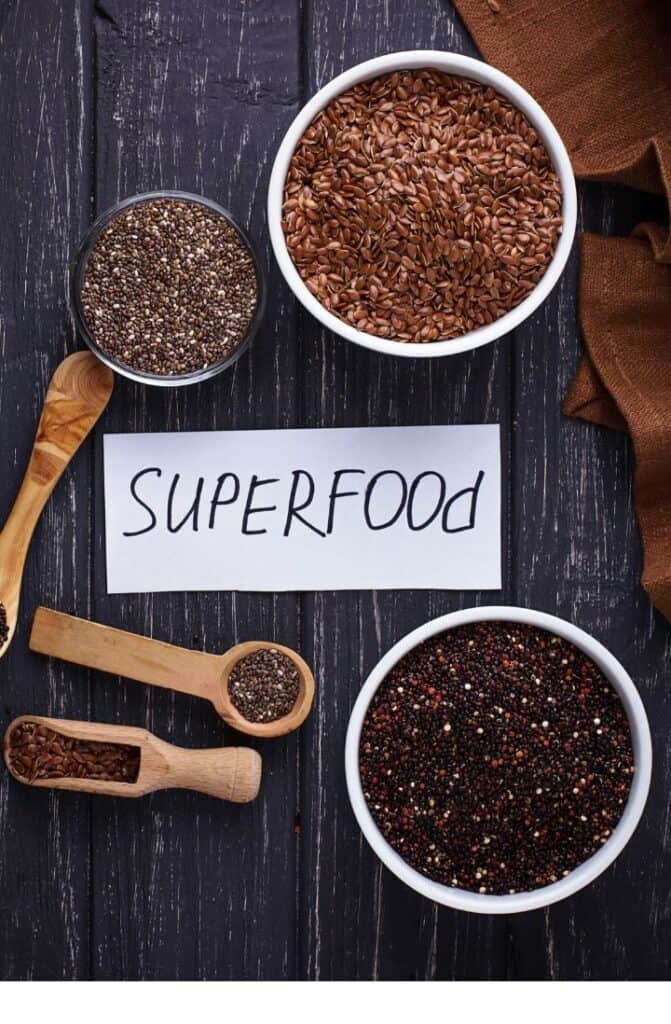
Nutritional Value
Chia seeds are a rich source of dietary fiber, protein, omega-3 fatty acids, and antioxidants. They also contain calcium, phosphorus, and magnesium. Flax seeds have a lot of nutritional value as well, they are high in lignans, which are plant compounds with antioxidant and estrogen-like properties. Flax seeds are also a good omega-3 fatty acids, fiber, and protein source.
Nutritional Value of Chia Seeds
Tiny but mighty, chia seeds are a nutritionally rich superfood with numerous health benefits. They are a great source of plant-based protein (20-25% by weight) which is great for vegetarians and vegans. These seeds also contain a balanced ratio of healthy fats, particularly omega-3 (ALA) and omega-6 fatty acids, which promote heart health.
This tiny seed is packed with essential vitamins and minerals like calcium, phosphorus, magnesium, potassium, and zinc, supporting bone health and overall well-being. Chia seeds provide various B vitamins, including thiamin, riboflavin, niacin, and folate, essential for metabolism and energy production.
The high fiber content found in chia seeds, consisting of both soluble and insoluble fiber, aids digestion, regulates bowel movements, and contributes to a feeling of fullness. The antioxidant properties of chia seeds, such as quercetin, kaempferol, and chlorogenic acid, help combat free radicals, reducing oxidative stress. Incorporating chia seeds into your diet can be a valuable step towards improved health which is a great way to get started on your health journey.
Nutritional Value of Flax Seeds
Flax seeds are highly nutritious seeds and are loaded with various health benefits. They have a significant amount of plant-based protein (20-25% by weight) and are rich in alpha-linolenic acid (ALA), an essential omega-3 fatty acid that supports heart health.
These little brown seeds are also packed with essential minerals such as manganese, magnesium, phosphorus, and copper, which can benefit bone health and enzyme activity. Flax seeds even contain vitamins like thiamin, niacin, and vitamin B6, which are all play a crucial role in energy metabolism.
Like chia seeds, flax seeds also have high fiber content, including both soluble and insoluble fiber. This fiber combination does wonders for your digestion and can help to regulate bowel movements. It may even assist in managing cholesterol levels. Flax seeds are well known for their lignan content, which acts as an antioxidant and potentially protects against certain cancers and cardiovascular diseases. Including flax seeds in the diet can be a beneficial way to promote overall well-being.
Comparison of Nutritional Value
Chia and flax seeds are both nutritious and versatile options for a balanced diet. They are excellent plant-based protein sources, loaded with essential omega-3 fatty acids, and have plenty of vitamins and minerals.
One thing that really stands out about chia seeds is their higher calcium content. This makes them beneficial for those seeking to increase their calcium intake. Flax seeds have some standout nutritional properties of their own, they are known for their rich lignan content, which provides antioxidant and potential hormone-balancing properties.
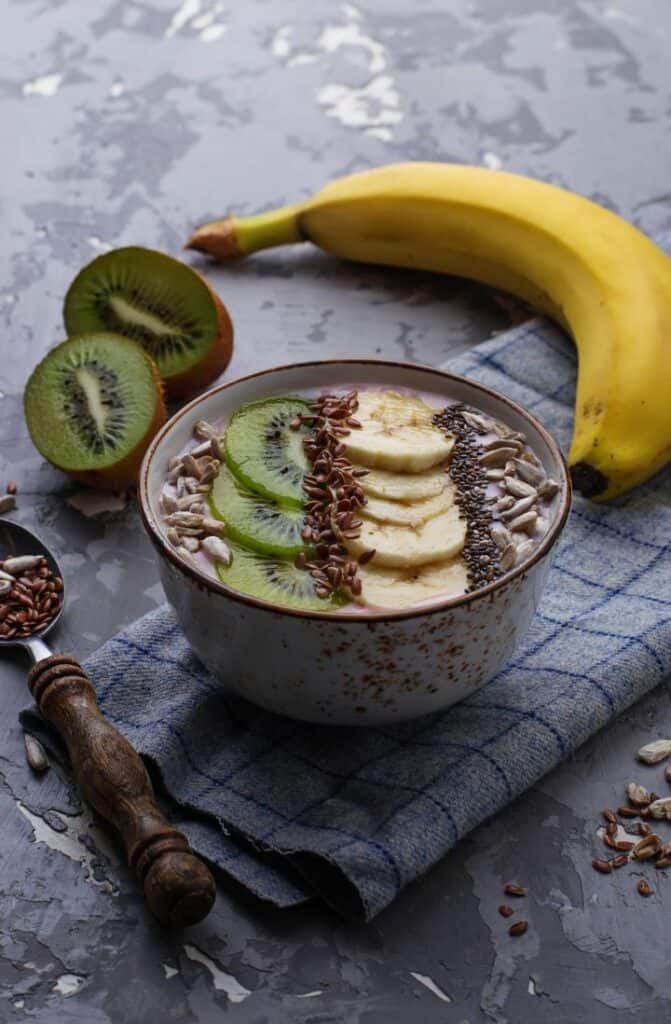
Health Benefits
Both chia seeds and flax seeds offer several health benefits. Chia seeds improve digestion, reduce inflammation, regulate blood sugar levels, and promote weight loss. Flax seeds, on the other hand, can help lower cholesterol levels, reduce the risk of heart disease, and improve brain function.
Health Benefits of Chia Seeds
Chia seeds are loaded with health benefits. They are rich in omega-3 fatty acids, particularly ALA, which supports heart health by reducing inflammation and the risk of heart disease. As mentioned earlier, the high fiber content in chia seeds aids digestive health.
Having regular bowel movements and a healthy digestive system is a key component of health. Chia seeds can even assist with weight management because they provide a feeling of fullness which can help to reduce overall calorie intake. They also have a low glycemic index, making them beneficial for managing blood sugar levels.
If bone health is on your mind, chia seeds are a good source of essential minerals like calcium, phosphorus, and magnesium, which all play a role in supporting bone health. It is no secret that many people are concerned with developing chronic health conditions these days, chia seeds are loaded with antioxidants that can protect cells from oxidative damage and potentially reduce the risk of chronic diseases. Incorporating chia seeds into the diet can be a valuable step towards improved overall well-being.
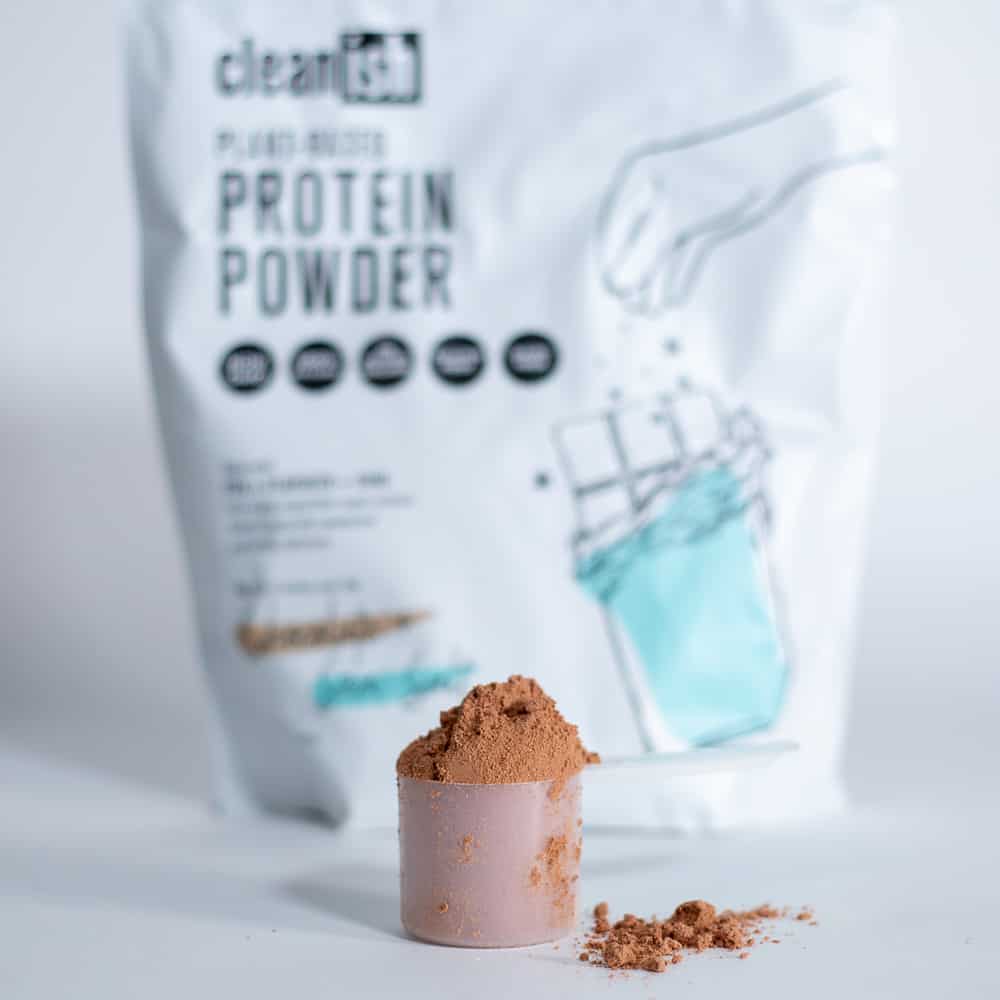
Health Benefits of Flax Seeds
Flax seeds also have lots of health benefits to offer those who consume them. One standout benefit is the positive impact they can have on your heart health. They are rich in ALA which can be known for promoting heart health and potentially lowering LDL cholesterol levels.
The fiber in flax seeds also aids digestion and can prevent constipation. Maintaining a healthy digestive system is crucial for staying healthy. Flax seeds' combination of fiber, protein, and healthy fats contributes to satiety and weight management. They also help stabilize blood sugar levels, benefiting individuals with diabetes or at risk of developing the condition.
Essential minerals like calcium, magnesium, and phosphorus, which are vital for maintaining strong bones, are plentiful in flax seeds. The high lignan content in flax seeds offers antioxidant properties that may protect against certain cancers and cardiovascular diseases. Incorporating flax seeds into the diet can contribute to overall well-being and health.
Comparison of Health Benefits
Both chia seeds and flax seeds offer numerous health benefits. They are rich in heart-healthy omega-3 fatty acids (ALA), promote digestive health, manage weight, and help regulate blood sugar levels. Both seeds also support bone health due to their calcium, phosphorus, and magnesium content. Chia seeds are a better source of calcium, making them beneficial for bone strength.
Flax seeds are particularly high in lignans, providing additional antioxidant and potential hormone-balancing benefits. Chia seeds have a milder flavor, making them more appealing to some individuals.
Both seeds are valuable sources of plant-based omega-3 fatty acids, crucial for brain health and reducing inflammation. Incorporating chia and flax seeds into the diet can contribute to overall well-being and provide diverse nutrients and health benefits.
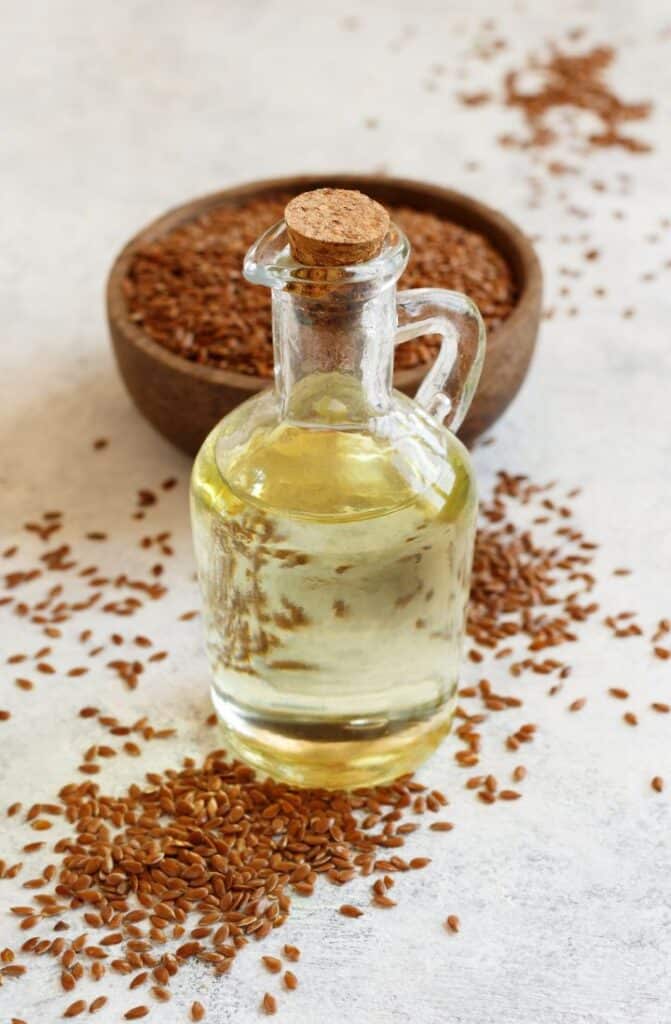
Uses
Chia seeds and flax seeds can be used in a variety of ways. Chia seeds can be added to smoothies, yogurt, and oatmeal or used to make a pudding. Flax seeds can be ground and added to smoothies and salads or used as a substitute for eggs or oil in baking.
Ways to Use Chia Seeds
- Chia Pudding: Mix chia seeds with your favorite milk (dairy or plant-based) and let it sit in the refrigerator until it forms a gel-like consistency. Add fruits or nuts for added flavor and texture.
- Smoothies: Blend chia seeds into your favorite smoothie for a nutritional boost. The seeds add thickness and provide extra fiber and nutrients.
- Overnight Oats: Combine chia seeds with rolled oats, milk, and other toppings like fruits, nuts, and honey. Leave it in the refrigerator overnight for a delicious and nutritious breakfast.
- Baked Goods: Add chia seeds to muffins, cookies, or bread dough for an extra nutritional punch.
- Chia Water: Mix chia seeds with water, and let them sit until it forms a gel-like drink. You can add lemon or lime juice and sweeteners for flavor.
- Chia Jam: Combine chia seeds with mashed fruit to make a spreadable fruit condiment.
Ways to Use Flax Seeds
- Ground Flaxseed: Grinding flax seeds into a fine powder improves nutrient absorption. Sprinkle the ground seeds on yogurt, smoothies, or oatmeal.
- Flaxseed Oil: Use flaxseed oil as a salad dressing or drizzle over cooked vegetables to benefit from its healthy fats and nutrients.
- Flax Egg: Combine ground flaxseed with water to make a vegan egg substitute for baking recipes.
- Baked Goods: Incorporate ground flaxseed into baked goods like muffins, pancakes, and bread for added fiber and nutrients.
- Flaxseed Yogurt Topping: Sprinkle whole or ground flax seeds over yogurt or cereal for a crunchy and nutritious topping.
Comparison of Flax and Chia Seed Usage
Both flax and chia seeds offer great versatility in the kitchen, making them easy to incorporate into a variety of dishes. Chia seeds have the unique ability to create a gel-like texture when mixed with liquid, making them ideal for creating chia pudding and acting as a natural thickening agent in recipes. On the other hand, flax seeds need to be ground to fully access their nutritional benefits, so it's important to either buy ground flaxseed or grind them at home before use.
In terms of taste, chia seeds have a milder flavor, while flax seeds have a slightly nuttier taste, which may influence personal preferences in culinary applications. While both seeds can be used whole or ground, flax seeds are typically used in their ground form to enhance nutrient absorption.
Additionally, chia seeds can be consumed directly without any preparation, while flax seeds should ideally be ground to unlock their full nutritional potential. Overall, both flax and chia seeds offer exceptional nutritional value and can be seamlessly integrated into a wide range of dishes to boost health and wellness.

Takeaways
Both chia and flax seeds offer a plethora of health benefits and can be valuable additions to a balanced diet. Chia seeds provide an excellent source of plant-based omega-3 fatty acids, supporting heart and brain health, while also promoting digestion and weight management through their high fiber and protein content.
Flax seeds offer similar benefits with their rich ALA content, aiding heart health and blood sugar regulation, along with their lignans, which possess potent antioxidant properties. Whether you choose chia or flax seeds, or even both, incorporating these tiny yet mighty seeds into your meals can contribute to improved overall well-being and add a nutritional boost to your favorite dishes.
While chia seeds have a mild flavor which makes them more appealing to some individuals. Both seeds can be easily incorporated into various dishes, offering various culinary possibilities. Both chia seeds and flax seeds offer a wide range of culinary possibilities. Chia seeds form a gel-like consistency when mixed with liquid, making them suitable for chia pudding and smoothies, while flax seeds need to be ground for better nutrient absorption and can be incorporated into baked goods and as a topping. Both seeds are highly nutritious and can be enjoyed as a healthy diet.
Including chia and flax seeds can contribute to overall health and well-being, which is why I included both chia protein and flaxseed into my cleanish plant-based protein formula. With their easy integration into various recipes and wide range of culinary uses, chia and flax seeds offer a simple and delicious way to enhance your diet and support a healthier lifestyle.

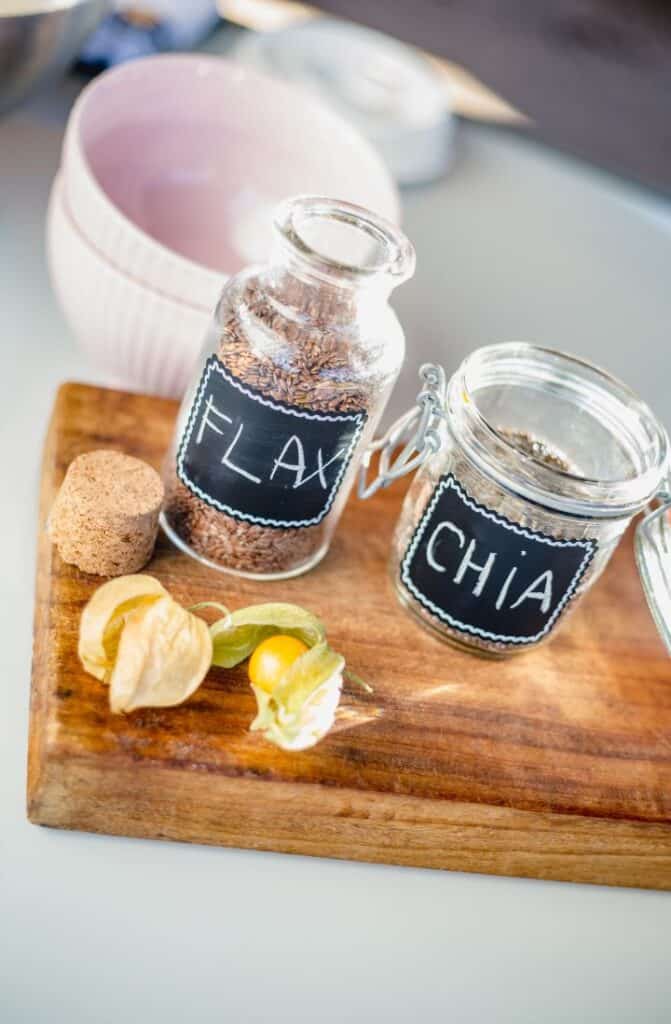

Lisa
I have always ground my flax seeds before consuming because they are not digestible. I was wondering if chia seeds should be ground for the same reason?
I just found you last week 8/23, and I love what I am reading!! I really needed to get back on track and you are my answer!! Thank you for doing this!!